12,038 people reached on Lassi with Lavina Facebook page – 934 engagements – 36 Likes –Harvinder Bassi, Meera Agarwal and 34 others
246 views on LinkedIn
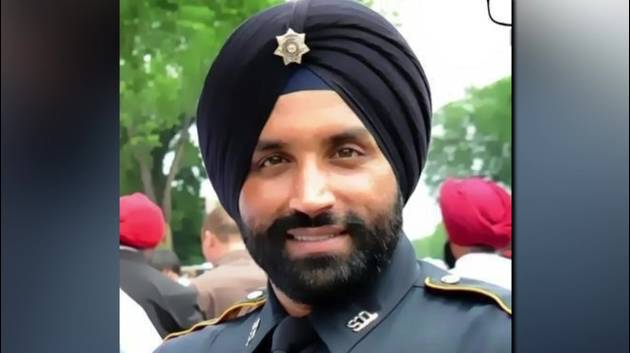
Sandeep Dhaliwal: Death of an American Hero
Guns, Racism – and a Community’s Grief
By Lavina Melwani
[dropcap]I[/dropcap]t was his smile that many people remember first. His warm, spontaneous smile. And of course, his turban which he wore proudly on his head, like a crown. He was the very first Sikh who was allowed to wear the turban and retain a beard as part of his uniform, opening up the path for many Sikhs to join the force and maintain their faith at the same time.
For Harris County Sheriff’s Deputy Sandeep Singh Dhaliwal of Houston, his turban was his article of faith, his strength, his joy – and perhaps the reason for his death.
On September 27, Deputy Dhaliwal was gunned down at a routine traffic stop. He was returning to his squad car when Robert Solis, the alleged gunman, shot him twice in the back. It was cold-blooded murder, and he died in hospital.
He was only 42 and leaves behind a wife and three young children.
“He was and continues to be all that is good, and all that is just,” Houston Mayor Sylvester Turner said, in declaring September 27, the day of Dhaliwal’s death, “Sheriff Deputy Dhaliwal Day.”
The shock and grief has been palpable, not only in the Sikh and Indian-American community but amongst all Americans. Thousands turned up at the vigils and at his memorial service, and fundraisers have raised hundreds of thousands of dollars for his bereaved family.
[dropcap]D[/dropcap]haliwal, who had trucking and pizza businesses, joined the police force to make a difference back in 2008 when members of the Sikh community had been harassed by deputies about the kirpans in their home. A report on NPR, noted that Dhaliwal always said public service was in his blood: “I always had the desire to be a police officer, as my father served in the navy – Indian navy, and my uncle served in the Indian military.”
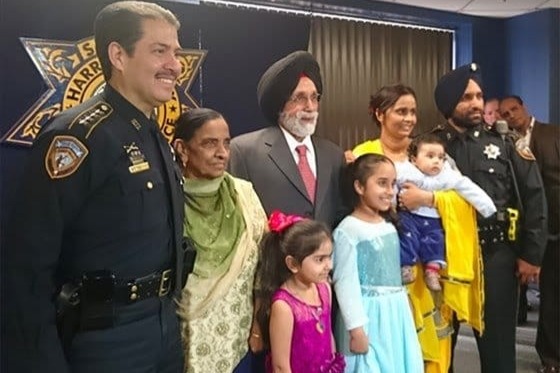
[dropcap]S[/dropcap]o who was Sandeep Dhaliwal and what made him tick? Trying to understand the man after he is gone, I browsed the hundreds of tributes written for his family. One from Pavneet Mavi shed some light on his early life: “It is a tough job! Only brave selfless people can take the “To Serve and Protect” oath. Sandeep Dhaliwal immigrated from India as a child. He gave away articles of Sikh faith by cutting his hair when he was a teenager. He wanted to be accepted. But another tenet of Sikh religion that has no physical manifestation is service to community. This path to serve led him to become a deputy. Sandeep reestablished his Sikh identity by wearing a turban, it completes him, and made him appear an “ unconventional identity”.
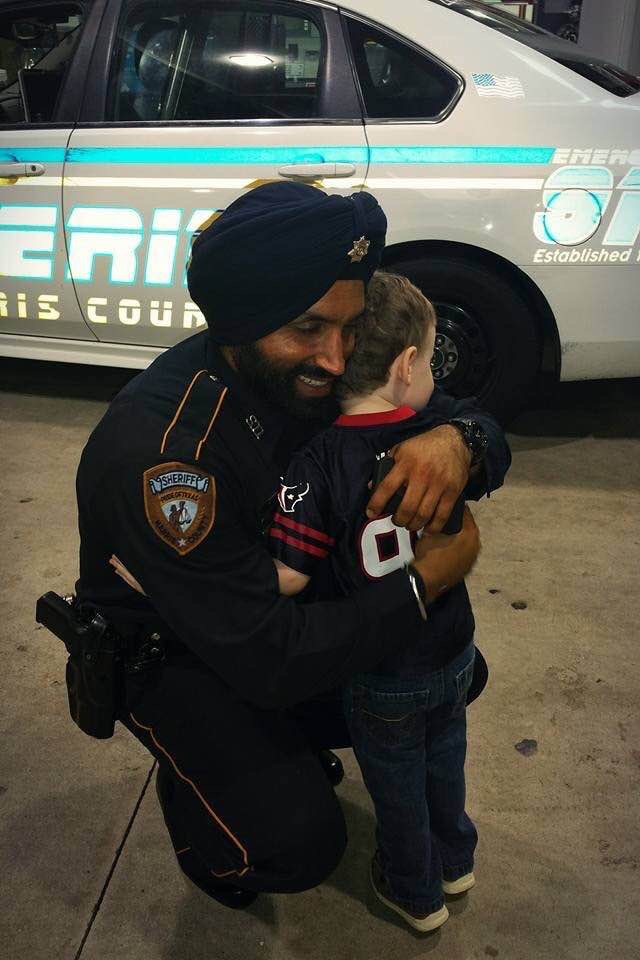
[dropcap]I[/dropcap]ndeed, in his early police career, he served without the turban which was not permitted as part of the uniform. The new sheriff Adrian Garcia who had convinced Dhaliwal to join the force to help transform it from the inside, changed the department policy to accommodate his turban and beard. As NPR noted, “It was a first for the county and the state. Garcia says he warned Dhaliwal about the possible consequences: “In uniform, you’re a target. When you wear a turban, you become even a bigger target.”
Dhaliwal became the first Sikh to be allowed to wear the turban in Texas in 2015. It was a hard-won right and he delighted in it. In a changing America where racism and hate have become overt, his turban made him almost a moving target. As a young man, he joined the force to rectify the absence of Indian-Americans in the workforce, and made it his life’s mission to have the impact of his community on the face of America.
Dhaliwal was all about making a difference. He was the Homeland Security Director for the United Sikhs and had served in the police force of Harris County, Texas for ten years. According to the United Sikhs, in the wake of Hurricanes Harvey, Irma and Maria, he led a team of volunteers to provide disaster relief to those in need across Texas, Florida and Puerto Rico. In Punjab India, he led the effort to help us provide humanitarian aid for farmers working to survive a record drought.
His father Piara Singh Dhaliwal noted in a statement, “Sandeep was a pillar of strength for the Sikh faith, community and our family. While we are completely heartbroken by the immense loss we feel, we find solace in knowing Sandeep will forever be in the hearts and memory of so many he touched.”
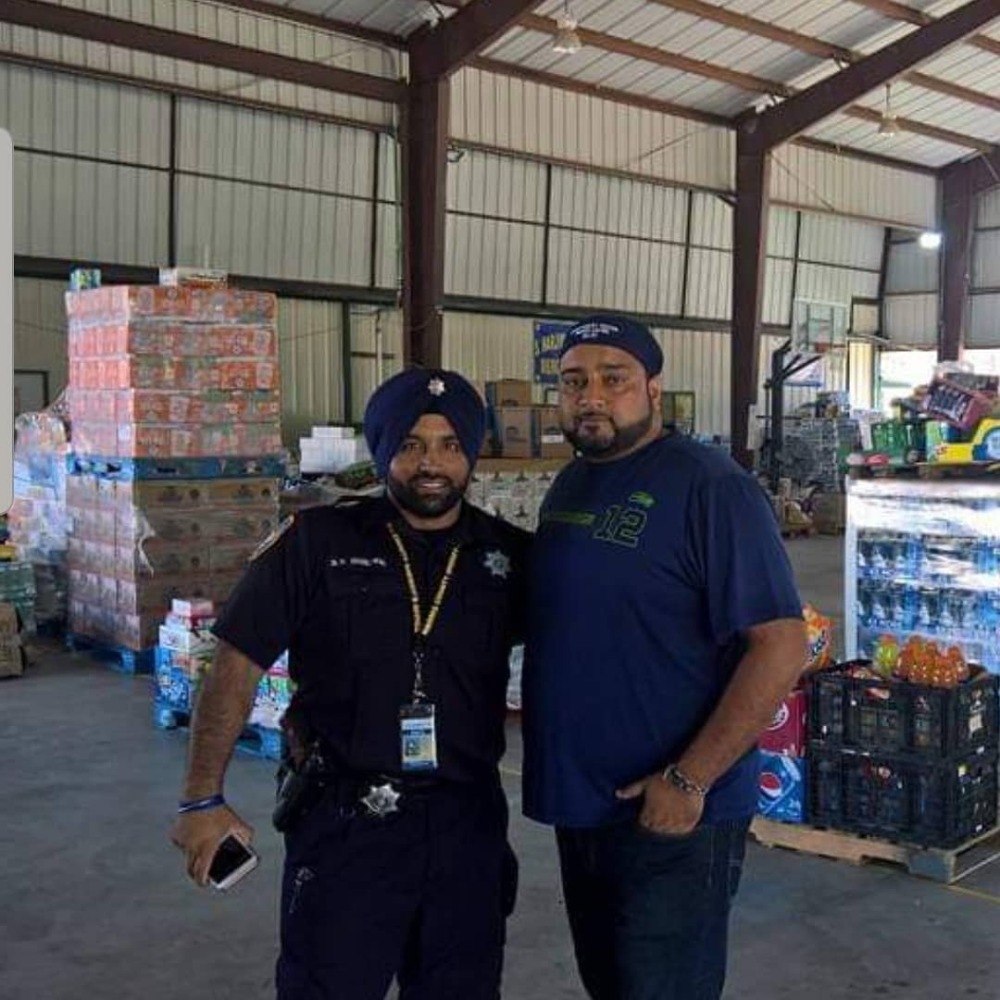
[dropcap]D[/dropcap]haliwal did indeed inspire many as one can see from the outpourings of tributes. As one person wrote: “Deputy Sandeep Dhaliwal was the reason I went from Seattle to Houston to help with Hurricane Katrina Relief efforts. He was someone I could relate to and drew me in. He was a great soul and touched many in his life. RIP Bro.”
Watching the funeral live on television, with thousands at the funeral and many more watching it from their homes, listening to the lament of the bagpipes, one felt the grief and the hopelessness. October 2nd, the day of his funeral, was also Mahatma Gandhi’s 150th birth centenary. Decades after Gandhiji was assassinated, it still is easy to gun down a good man and non-violence remains an idealized concept.
The United Sikhs legal department has been retained by Dhaliwal’s family to ensure justice is served to the fullest extent of the law against the suspected shooter.
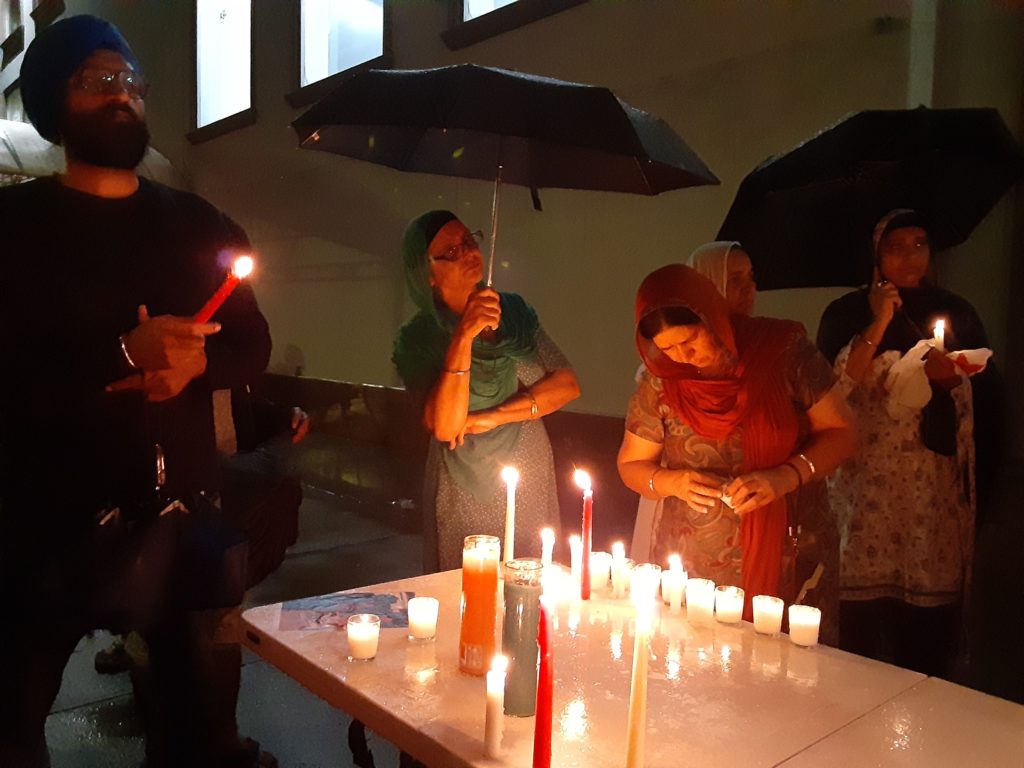
On the date of the funeral in Texas, a vigil was planned in New York by the Sikh Cultural Society in Richmond Hill, Jamaica, the tri-state area’s oldest and largest Sikh temple. I trekked to this vigil with many others in pouring rain but the rain soon reduced to a sad drizzle and the crowd stood under umbrellas with lit candles in the dark, ordinary people and city officials.
As Harpreet Singh Toor, community activist and chairman of external affairs at the Sikh Cultural Society told me, “Sandeep Dhaliwal actually fought to have the right to serve with the turban in the police department – he was an immigrant who laid down his life to protect the law of the land. When immigrants are being labeled as criminals, this goes counter to that. He laid down his life without even thinking about it and doing the job he was supposed to do.”
Racism and hate of The Other have indeed become a big divider in America. The Sikh community has been vigilant about educating people, for Sikhism and the tenets of the Sikh faith have often been the targets of the ignorant.
Deputy Sandeep Dhaliwal showed that it is vital to stand for what you believe in, and sometimes a brief life can be even more impactful, measured not in the years lived but by the deeds done. As one mourner wrote: “Deputy Dhaliwal represented the very essence of Sikhism: selfless service.”
Courage is in short supply in America and the hope is that this tragedy will ignite a new conversation about the urgency for gun control and a dialogue about race and hate crimes in America.
https://www.facebook.com/NBCNews/videos/462087244381647/
(This article first appeared in my weekly column India in America in CNBCTV18.com)

1 Comment
Leena B. Parker via Facebook
RIP So very sad – you were a hero! Your legacy will live on.